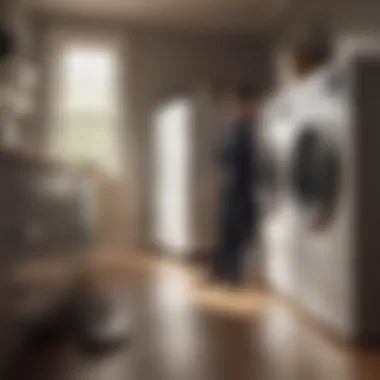The Importance of Monthly Home Maintenance Services


Intro
Maintaining a home can often feel like an ongoing puzzle, requiring time, effort, and often financial resources. Monthly home maintenance services emerge as a strategic approach to streamline this process. These services are more than just tasks to tick off a list; they play an essential role in preserving the value of one’s property. Additionally, they contribute to a safe and comfortable living environment.
For homeowners and housewives, understanding the different aspects of monthly maintenance services is crucial. This article will delve into their significance. It offers a glimpse into the types of services available, the advantages of having a regular maintenance schedule, and essential tips for choosing the right service provider.
Being proactive rather than reactive in home maintenance can save both time and money in the long run. To appreciate fully how monthly services fit into homeownership, we will explore various maintenance tasks that can be performed routinely.
Ultimately, this discourse aims to enrich the reader's comprehension of home upkeep, allowing them to make informed decisions regarding their living spaces. By ensuring that homes are well-maintained, homeowners can enjoy their spaces more fully, free from the stress of unexpected repair issues.
Understanding Home Maintenance
Home maintenance encompasses the ongoing efforts required to keep a property in optimal condition. This concept is essential for homeowners who wish to protect their investment and ensure that their living environment remains safe and comfortable. Regular maintenance not only prevents larger issues from emerging but also contributes positively to the overall value of the property.
By taking a systematic approach to home maintenance, homeowners can identify potential problems early. For example, checking for leaks or ensuring electrical systems are safe can save money in the long run. This section will provide a clear understanding of the definitions and categories associated with home maintenance, helping homeowners appreciate why consistent upkeep is necessary.
Definition of Home Maintenance
Home maintenance can be defined as the process of systematically inspecting, repairing, and preserving residential properties. This task involves routine tasks that aim to maintain a home's functionality. Effective home maintenance ensures that all systems—such as plumbing, heating, and electrical—function properly while also providing a safe living environment.
In simpler terms, home maintenance is not merely about fixing things when they break. It includes making sure everything is in working order before problems arise. Regular check-ups and maintenance can limit the need for costly repairs down the road.
Types of Home Maintenance
There are primarily three types of home maintenance: preventive, corrective, and emergency maintenance. Each type plays a role in effectively managing a home and ensuring it remains a safe space.
Preventive Maintenance
Preventive maintenance refers to the actions taken to prevent potential issues before they arise. Its key characteristic is its proactive nature, making it a popular choice among homeowners. By regularly inspecting HVAC systems, ensuring proper insulation, and servicing appliances, homeowners can avoid more significant problems and expenses in the future. The unique feature of preventive maintenance is that it allows homeowners to have a proactive plan in place.
Advantages of Preventive Maintenance:
- Reduces the likelihood of major repairs.
- Increases the life expectancy of home systems and appliances.
- Provides peace of mind for homeowners, knowing issues are addressed before they escalate.
Corrective Maintenance
Corrective maintenance involves fixing problems after they have been identified. This type is often considered reactive, responding to issues as they occur. The key characteristic of corrective maintenance is straightforward: it only kicks in when a problem presents itself. Homeowners often feel that corrective maintenance is a necessary option when preventive measures have failed or been neglected.
Advantages of Corrective Maintenance:
- Potentially lower short-term costs, as it deals only with current issues.
- Can be necessary for systems that require immediate attention.
However, relying solely on corrective maintenance can lead to more significant long-term costs, as small issues may become larger over time.
Emergency Maintenance
Emergency maintenance is the most urgent type, typically required when immediate repair is necessary to protect the safety and security of the home. This can include issues such as broken pipes, electrical outages, or gas leaks. The key characteristic of emergency maintenance is the immediacy of response to crises that could lead to significant damage if not addressed quickly.
Advantages of Emergency Maintenance:
- Immediate action can prevent further damage.
- Essential for ensuring safety in the home environment.


On the downside, emergency maintenance often comes with higher costs due to the urgency and specialized services needed. Therefore, homeowners should strive to prevent situations requiring emergency maintenance through effective preventive measures.
"A well-maintained home does not just protect one's investment; it ensures ongoing comfort and safety for its occupants."
By understanding the definitions and types of home maintenance, homeowners can better navigate the complexities of maintaining their properties effectively.
Importance of Monthly Maintenance
Monthly home maintenance is an essential practice that ensures the longevity and efficiency of residential properties. By engaging in regular maintenance activities, homeowners can anticipate a myriad of benefits that go beyond mere aesthetics. This section will elaborate on the significant aspects of monthly maintenance, focusing on cost savings, property value enhancement, and improved safety and security.
Cost Savings Over Time
One of the most compelling reasons for committing to a monthly maintenance schedule is the potential for substantial cost savings. Regular inspections and minor repairs often prevent more extensive damage, which can be costly to fix. For instance, checking the HVAC system monthly may identify small issues that, if ignored, could lead to complete system failure requiring a full replacement.
Keeping a routine can also extend the lifespan of important home systems and appliances. By maintaining equipment like water heaters or plumbing, one can avoid premature replacements due to lack of proper care. Moreover, many issues escalate quickly if not addressed, leading to higher expense in the future.
An investment in monthly maintenance is essentially an investment in one’s financial well-being. This proactive approach minimizes unexpected costs, making household budgeting more predictable and sustainable.
Enhancing Property Value
The real estate market heavily weighs the condition of a property when determining its value. Homes that demonstrate regular maintenance are inherently more appealing to buyers. Updating and maintaining the property consistently fosters a perception of care and responsibility.
Regular upkeep can enhance both interior and exterior spaces. Tasks like mowing the lawn, cleaning gutters, and ensuring paint is fresh contribute to curb appeal. Thus, potential buyers are more likely to consider properties that have clear evidence of regular maintenance.
Homeowners should consider a regular annual review of appliances and systems as well. This not only helps catch minor problems but might also be a point of negotiation when selling a house. A well-maintained property can command a better price compared to similar homes lacking regular service records.
Improving Safety and Security
Another critical benefit of monthly maintenance relates to safety and security. Regular checks of safety systems such as smoke detectors, fire alarms, and locks ensure that they function effectively. In periods of emergency, reliable doors and windows can delay intruders, contributing to heightened security.
Moreover, neglecting home maintenance can lead to health hazards. For instance, failing to address mold issues can result in serious health complications for residents. Similarly, ensuring that the electrical systems are routinely inspected can prevent fire risks caused by faulty wiring.
Hence, a diligent approach to maintenance not only safeguards the property but also protects the individuals living in it. Homeowners can rest easier, knowing that their home is in good condition and that potential risks are minimized.
Regularly assessing and maintaining your home can be key to safeguarding your investment and ensuring a safe living environment.
In summary, the importance of monthly maintenance is manifold, encompassing financial, aesthetic, and safety aspects. By investing time and effort into regular upkeep, homeowners can reap long-term benefits that substantially outweigh modest initial costs.
Common Monthly Maintenance Tasks
Home maintenance is an ongoing responsibility. Among the multitude of tasks, monthly maintenance tasks are essential for the longevity of a property. Performing these tasks can often prevent larger issues from arising. When homeowners engage consistently in monthly maintenance, they safeguard their property against unexpected damages and costly repairs.
HVAC System Checks
Monitoring your heating, ventilation, and air conditioning (HVAC) system is crucial for ensuring comfort and efficiency throughout the year. Regular checks helps in identifying issues early. This can include replacing filters regularly to improve air quality and system performance. According to recent studies, homes with well-maintained HVAC systems use about 15% less energy.
- Replace filters monthly.
- Inspect refrigerant levels to check for leaks.
- Clean condenser coils to maintain efficiency.
Plumbing Inspections
The plumbing system in any home is vital for functionality. Monthly inspections can avert major leaks, preventing water damage. This process can involve checking for signs of corrosion and leaks under sinks and around toilets, ensuring faucets and showers are operating correctly. A minor leak can turn into a significant issue leading to costly repairs. Attention to these details will keep plumbing systems in check.
- Inspect joints for any signs of leakage.
- Check water pressure for consistency.
- Monitor for unusual sounds from pipes.


Electrical System Reviews
Electrical systems require careful attention to prevent risks like electrical fires. Conducting monthly reviews serves as a proactive measure against malfunction. Homeowners should check circuit breakers and troubleshoot any inconsistencies. Look for frayed wires and ensure all outlets are functioning correctly to maintain safety standards. Adopting these practices can enhance safety and improve energy usage.
- Inspect outlets for damage.
- Test smoke detectors to ensure they function properly.
- Check for overloading in circuits.
Gutter Maintenance
Gutters protect homes from water damage. They funnel rain away from the foundation. Monthly maintenance involves clearing leaves and debris to avoid clogging. Clogged gutters can cause water overflow, which may damage roofs and foundations. Observing your gutters regularly allows for timely action which prevents more extensive issues down the line.
- Remove leaves and debris.
- Inspect for rust or other signs of wear.
- Ensure downspouts direct water away from the home.
Benefits of Subscription-Based Maintenance
The idea of subscription-based maintenance has grown increasingly popular among homeowners. This shift in perspective highlights the tangible advantages it offers. Monthly services help maintain the home in good condition while also providing several key benefits that streamline the maintenance process. Understanding these benefits can lead to better decision-making about home upkeep.
Predictable Expenses
One of the most significant advantages of a subscription-based maintenance model is predictable expenses. Homeowners can budget each month knowing exactly how much they will spend on maintenance. This predictability allows for better financial planning, ensuring funds are allocated for essential tasks without the risk of unexpected costs.
Additionally, this financial predictability can prevent stress during emergency situations. Homeowners no longer need to sift through finances in times of urgency. Fixed monthly payments cover various services, allowing peace of mind while handling issues that could arise unexpectedly.
Access to Professional Expertise
Subscription-based maintenance often provides access to a skilled pool of professionals. Many companies offer well-trained technicians who specialize in various areas, including plumbing, electrical work, and HVAC systems. This access means homeowners can rely on experts rather than attempting repairs or maintenance themselves, which could lead to errors or costly mistakes.
Having professionals handle the work not only ensures quality but also means homeowners benefit from up-to-date knowledge. Technology and building codes change frequently, and experts in the field are more likely to stay informed about the latest requirements and best practices. This professional approach is crucial in preserving the integrity of the home and increasing its value over time.
Regular Schedule and Accountability
A structured schedule is another vital component of subscription services. Monthly maintenance tasks are pre-planned, ensuring that nothing is overlooked. This regular schedule allows for consistent attention to the home's needs. White neglect often leads to bigger problems, a regular maintenance plan helps catch issues early on before they escalate into costly repairs.
With a set plan in place, accountability is also elevated. Providers are responsible for fulfilling their obligations, and homeowners can expect service according to the agreed timeline. This not only keeps property in better shape, but also helps to build a trustworthy relationship between homeowners and maintenance providers. By having a clear schedule, communication becomes more efficient, reducing the chances of misunderstandings regarding service expectations.
In summary, subscription-based maintenance presents a strategic approach to home upkeep that emphasizes financial predictability, access to expertise, and structured accountability. Embracing this model enables homeowners to safeguard their investments while enhancing their overall living environment.
Choosing the Right Maintenance Provider
Selecting an appropriate maintenance provider is a critical component of effective home upkeep. A competent provider can preserve the integrity of a property and alleviate owners of time-consuming tasks. It is essential to understand what to look for to ensure that the chosen provider aligns with one's specific needs and standards.
Evaluating Qualifications and Experience
When considering a maintenance provider, evaluating their qualifications and experience is crucial. Providers should possess appropriate licenses and certifications relevant to their field. This indicates adherence to industry standards and regulations, ensuring that they operate knowledgeably and professionally.
Experience matters significantly in the service industry. A provider with a solid track record is likely to possess honed skills and effective problem-solving capabilities. Look for providers with successful histories in tasks similar to those required for your home, whether it be HVAC maintenance, plumbing, or electrical inspections.
Understanding Service Agreements
Service agreements outline the expectations and terms of the maintenance services provided. Understanding this aspect is essential for clarity and satisfaction.
Scope of Services


The scope of services refers to the specific tasks that the maintenance provider will cover. A clear scope is essential, as it delineates what services are included in the agreement. If a provider offers comprehensive services, it can be a significant advantage. This could cover areas like HVAC, plumbing, and general repairs, ensuring that all aspects of home maintenance are managed effectively. However, be mindful of vague or overly broad scopes that may lead to unexpected costs.
Contract Terms
Contract terms are equally important. They define the duration of service and conditions under which services are provided. A well-defined contract can prevent misunderstandings later on. Terms should be flexible enough to cater to changing homeowner needs. It is wise to note any clauses related to price adjustments or service changes. Ensuring that both parties have clear expectations contributes to a healthier working relationship.
Cancellation Policies
Cancellation policies should also be clearly understood. These policies communicate what happens if a homeowner needs to terminate the service agreement. A fair cancellation policy accommodates unforeseen circumstances while protecting the provider's interests. Know whether penalties apply and if there’s a process to follow for cancellation. A provider with liberal cancellation policies may indicate a commitment to customer satisfaction.
Reading Reviews and Recommendations
Reading reviews and gathering recommendations provides insight into a provider's reliability and service quality. Look for feedback from previous customers, as they can reveal important information regarding promptness, workmanship quality, and customer service. Online platforms or local community forums can be useful resources for this purpose. Personal recommendations from friends or family often carry significant weight. Ultimately, gathering insights from multiple sources helps create a well-rounded picture of potential providers, guiding informed decision-making.
Implementing Your Maintenance Plan
Implementing an effective maintenance plan is vital for homeowners. It ensures that every aspect of home upkeep is systematically attended to. Regular maintenance can significantly reduce costs associated with major repairs in the future. It also helps in maintaining the aesthetic and functional appeal of your property. Without a clear plan, maintenance tasks can become overwhelming, leading to neglect and ultimately degradation of the home.
Creating a Maintenance Schedule
A maintenance schedule serves as the foundation for an effective maintenance plan. It outlines tasks, timelines, and specific responsibilities. Creating one involves several steps:
- Identify Key Areas: Determine which areas in the home require regular attention. This includes HVAC systems, plumbing, roofing, and appliances.
- Frequency of Tasks: Decide how often each task should be completed. Some tasks may need monthly attention, while others can be quarterly or annually.
- Allocate Time: Assign specific time slots for each task on the schedule. This helps in managing your time and ensures no task is overlooked.
- Engage Professionals: For complex tasks, consider scheduling professional services. This guarantees quality and compliance with safety standards.
- Flexibility: Include room for adjustments. Life can be unpredictable, so having flexibility in the schedule is important.
A well-structured maintenance schedule not only keeps your home in peak condition but also provides a sense of achievement and control.
Budgeting for Maintenance Costs
Budgeting for maintenance costs is crucial for homeowners. It prepares you for both planned and unexpected expenses. Here are important considerations for effective budgeting:
- Estimate Costs: Research average costs for various maintenance tasks. Websites like Wikipedia or Britannica can offer insights into typical expenditure related to home maintenance.
- Set a Monthly Allocation: Determine how much money you can allocate each month toward maintenance. Many experts suggest setting aside 1% of your home’s value per year for maintenance.
- Track Expenses: Keep a record of all maintenance-related expenses. This not only helps in tracking spending but also assists in adjusting future budgets.
- Emergency Fund: Maintain a separate emergency fund for unexpected repairs. This can prevent financial strain when urgent issues arise.
When you budget effectively for maintenance costs, you ensure that your home remains a safe and comfortable environment. It also mitigates the stress of financial surprises when problems occur.
"A proactive maintenance plan is the best strategy for any homeowner to avoid costly repairs and maintain home value."
By implementing your maintenance plan effectively, you create a home environment that is not only efficient but also financially sound.
The Future of Home Maintenance Services
The landscape of home maintenance services is changing rapidly. As technology advances, homeowners are facing new challenges and opportunities that will influence how maintenance is conducted each month. Understanding these changes is crucial for house owners to ensure they are making informed decisions regarding their properties. The future of home maintenance services offers benefits such as enhanced efficiency, improved service quality, and a more sustainable approach to home management.
Emerging Trends and Technologies
Several trends are taking shape in the home maintenance sector that are likely to reshape how services are delivered. One major trend is the increasing use of smart home technology. Devices such as smart thermostats, leak detectors, and smart home hubs allow homeowners to monitor their homes in real-time. These technologies can alert homeowners about potential issues before they become significant problems, ultimately saving time and money.
Artificial intelligence is also making waves in the industry. Companies are increasingly using AI to analyze maintenance needs based on data collected from various home systems. This analysis can help predict when certain maintenance tasks will be necessary, allowing for more proactive management.
Another noteworthy development is the rise of virtual consultations. Many service providers now offer remote appointments through video calls. This approach can enhance convenience and reduce the need for physical visits, streamlining the maintenance process.
Sustainability in Home Maintenance
Sustainability is becoming a priority in the home maintenance domain. More homeowners are seeking eco-friendly solutions to minimize their carbon footprint. Services that focus on sustainable practices, like energy-efficient upgrades and environmentally friendly cleaning products, are increasingly in demand.
Reducing waste through proper recycling and environmentally sound disposal methods is another focus area. Maintenance providers offering sustainable options not only cater to the ecological conscience of homeowners but also enhance their marketability.
"Embracing sustainable practices does not merely reflect a trend, it signifies a long-term commitment to our environment and resources."
Finally, integrating energy-saving solutions into maintenance can significantly reduce utility bills. Initiatives such as LED retrofitting, duct sealing, and solar panel installations are viable options that contribute positively to sustainability efforts while also appealing to economically minded homeowners.















